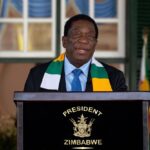Harare – Ten years have passed since the disappearance of human rights activist and journalist Itai Dzamara, and the pressure on the Zanu PF government to provide answers is only intensifying.
Dzamara was last seen on March 9, 2015, allegedly abducted from his home in Glenview, Harare, by State security operatives in an unmarked vehicle. The circumstances surrounding his disappearance remain shrouded in mystery, fueling persistent calls for a thorough and transparent investigation.
Campaigners and activists have voiced their condemnation of the ruling party, with some branding it a “terrorist organisation” that must be held accountable for Dzamara’s disappearance.
Former Zengeza West MP Job Sikhala stated unequivocally that the Zanu PF-led government knows the whereabouts of Dzamara and owes the public an explanation.
“The regime knows what happened to Itai Dzamara,” Sikhala said. “It is the duty of every government to protect its citizens. The security of every person falls in the hands of the State. We still demand with our loud voices to know what happened to Itai. It remains a serious issue of public interest.”
Award-winning human rights lawyer Arnold Tsunga, Principal Managing Partner at Tsunga Bhamu Law International, has implored the President Emmerson Mnangagwa-led government to publicly explain its failure to bring the perpetrators of Dzamara’s abduction to justice.
“The government has to do all in its powers to make a public and open announcement on why it has not been possible to bring the perpetrators of the abduction of Itai Dzamara to account,” he said.
Tsunga emphasised the devastating impact of Dzamara’s disappearance on his family and the broader human rights community. “The failure of any progress, it really affects human rights activists and in particular it affects the family. The family of a disappeared person, they suffer uncertainty, trauma, and they don’t have closure,” he added.
“It’s a threat to the rule of law; it’s a threat to the justice and accountability. It reduces confidence of people in the ability of our law enforcement system to be able to protect the citizens.”
Obert Masaraure, a human rights defender and president of the Amalgamated Rural Teachers Union of Zimbabwe (ARTUZ), did not mince words, describing Zanu PF as a “terrorist organisation” and warning that those responsible for Dzamara’s disappearance would eventually face retribution.
“The Dzamara story reminds us that the Zanu PF party is a terrorist organisation. We will not tire to demand the return of Dzamara. Those who abducted him Dzamara will be forced to pay in the coming Zimbabwe,” he said.
Efforts to obtain comment from the government proved unsuccessful, as both Information Minister Jenfan Muswere and Information Permanent Secretary Nick Mangwana could not be reached on their mobile phones.
However, Zanu PF Director of Communication Farai Marapira dismissed the allegations, asserting that human rights defenders and activists bear the burden of proof. He described Zanu PF as a law-abiding institution.
“He who alleges must prove. It is sad that some people would seek cheap mileage over another family’s anguish. We are a law-abiding institution which holds the laws of our land sacrosanct. It is crass madness to then associate us with such a vile accusation,” Marapira said.
The issue is further complicated by Zimbabwe’s failure to sign or ratify the United Nations International Convention for the Protection of All Persons from Enforced Disappearance, despite repeated calls from UN Member States. The government appears to be dragging its feet on this critical issue.
This convention came into being in 2006 and started being implemented in 2010.
Shava deplored what he described as a systematic pattern of enforced disappearance, abduction, torture, and cruel and degrading treatment. He asserted that numerous individuals, including himself, human rights defenders, opposition political party supporters, legislators, and ordinary citizens, have been subjected to these acts, with some also being injected with unknown substances.
As the tenth anniversary of Itai Dzamara’s disappearance passes, the calls for justice and accountability grow louder, placing increasing pressure on the Zimbabwean government to address this unresolved and deeply troubling case.












